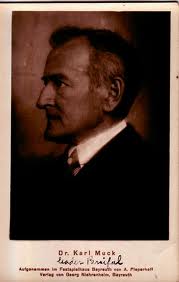Dr. Karl Muck, conductor: Difference between revisions
No edit summary |
|||
| Line 1: | Line 1: | ||
====Date: [[:Category: | ====Date: [[:Category:1918|1918]]==== | ||
====Region: [[:Category:North America|North America | ====Region: [[:Category:North America|North America]]==== | ||
====Subject: [[:Category:Political/Economic/Social Opinion|Political/Economic/Social Opinion | ====Subject: [[:Category:Political/Economic/Social Opinion|Political/Economic/Social Opinion]]==== | ||
====Medium: [[:Category:Music|Music | ====Medium: [[:Category:Music|Music]]==== | ||
---- | ---- | ||
[[File:Muck.jpg|right]] | |||
'''Artist:''' Dr. Carl Muck | '''Artist:''' Dr. Carl Muck | ||
'''Confronting Bodies:''' | '''Confronting Bodies:''' United States Government | ||
'''Dates of Action:''' March 26, 1918 | '''Dates of Action:''' March 26, 1918 | ||
| Line 17: | Line 18: | ||
'''Description of Artwork:''' A concert of the Boston Symphony Orchestra in Providence, Rhode Island | '''Description of Artwork:''' A concert of the Boston Symphony Orchestra in Providence, Rhode Island | ||
'''The Incident:''' "...In November 1917, at a concert of the Boston Symphony Orchestra in Providence, Rhode Island, the conductor ignored the joint request of nine women's clubs that the orchestra play "The Star Spangled Banner" either before or after the program..." Censorship, Princeton 1991 pg. 195 This incident prompted a great deal of press coverage including a verbal response from President Theodore Roosevelt condemning his actions. | '''The Incident:''' "...In November 1917, at a concert of the Boston Symphony Orchestra in Providence, Rhode Island, the conductor ignored the joint request of nine women's clubs that the orchestra play "The Star Spangled Banner" either before or after the program..." (Censorship, Princeton 1991 pg. 195) This incident prompted a great deal of press coverage including a verbal response from President Theodore Roosevelt condemning his actions. | ||
'''Results of Incident:''' "..By March 26, 1918, Dr. Muck had been placed in jail on the ground that his presence at large was a danger to the peace and safety of the country. He was arrested and held on a Presidential warrant after the Department of Justice had made an extensive investigation "of his record of pro-German sympathies and utterances." And May 1918 saw the former conductor of the Boston Symphony Orchestra in an internment camp at Fort Ogelthorpe, Georgia..." Censorship, Princeton 1991 pg. 195 "...In June 1919, although Dr. Muck was still in the internment camp, plans were being made for his deportation. The next item about ( | '''Results of Incident:''' "..By March 26, 1918, Dr. Muck had been placed in jail on the ground that his presence at large was a danger to the peace and safety of the country. He was arrested and held on a Presidential warrant after the Department of Justice had made an extensive investigation "of his record of pro-German sympathies and utterances." And May 1918 saw the former conductor of the Boston Symphony Orchestra in an internment camp at Fort Ogelthorpe, Georgia..." (Censorship, Princeton 1991 pg. 195) "...In June 1919, although Dr. Muck was still in the internment camp, plans were being made for his deportation. The next item about (Dr. Muck) appeared in March 1921. From the safe distance of The Hague in the Netherlands, Muck was able to relate his woes in the Unites States. He denied disloyal actions in America and was said to have stated "I was accused of espionage because I conducted German music and naturally associated with my German compatriots." (Censorship, Princeton 1991 pg. 195) | ||
'''Source:''' Censorship, Princeton 1991 pg. 195 | '''Source:''' Censorship, Princeton 1991 pg. 195 | ||
[[Category: | [[Category:1918]] | ||
[[Category:]] | [[Category:1910s]] | ||
[[Category:]] | [[Category:20th century]] | ||
[[Category:North America]] | [[Category:North America]] | ||
[[Category:Political/Economic/Social Opinion]] | [[Category:Political/Economic/Social Opinion]] | ||
[[Category:Music]] | [[Category:Music]] | ||
[[Category:Dr. Carl Muck]] | [[Category:Dr. Carl Muck]] | ||
{{DEFAULTSORT:Muck, Dr. Carl, conductor}} | |||
__NOTOC__ | __NOTOC__ | ||
Revision as of 16:13, 6 December 2011
Date: 1918
Region: North America
Subject: Political/Economic/Social Opinion
Medium: Music
Artist: Dr. Carl Muck
Confronting Bodies: United States Government
Dates of Action: March 26, 1918
Location: United States
Description of Artwork: A concert of the Boston Symphony Orchestra in Providence, Rhode Island
The Incident: "...In November 1917, at a concert of the Boston Symphony Orchestra in Providence, Rhode Island, the conductor ignored the joint request of nine women's clubs that the orchestra play "The Star Spangled Banner" either before or after the program..." (Censorship, Princeton 1991 pg. 195) This incident prompted a great deal of press coverage including a verbal response from President Theodore Roosevelt condemning his actions.
Results of Incident: "..By March 26, 1918, Dr. Muck had been placed in jail on the ground that his presence at large was a danger to the peace and safety of the country. He was arrested and held on a Presidential warrant after the Department of Justice had made an extensive investigation "of his record of pro-German sympathies and utterances." And May 1918 saw the former conductor of the Boston Symphony Orchestra in an internment camp at Fort Ogelthorpe, Georgia..." (Censorship, Princeton 1991 pg. 195) "...In June 1919, although Dr. Muck was still in the internment camp, plans were being made for his deportation. The next item about (Dr. Muck) appeared in March 1921. From the safe distance of The Hague in the Netherlands, Muck was able to relate his woes in the Unites States. He denied disloyal actions in America and was said to have stated "I was accused of espionage because I conducted German music and naturally associated with my German compatriots." (Censorship, Princeton 1991 pg. 195)
Source: Censorship, Princeton 1991 pg. 195
